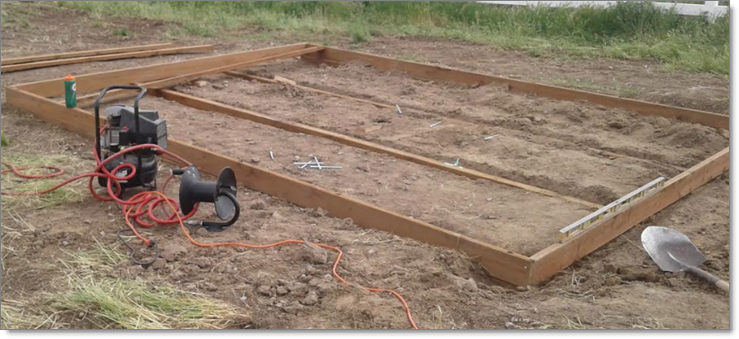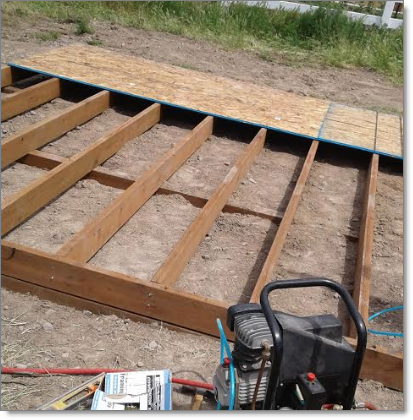Today I spent time with my dad sealing the chicken coop, which is super important because soon we’ll have more rain and snow. I would hate for my wood to get rotten just because we didn’t do this important step!
Painting is a slow process… which means you get to stand in one place for too long. While spending so much intimate time with my coop, talking to my dad and thinking about my kids that are growing up and getting ready to do grown-up things, I thought about this project that I wasn’t quite sure I could do (but I did it!! With help, of course). I like to go out every once in a while and slap a wall, just to make sure it doesn’t move. Kind of like how, before you buy a car, you kick the tires. Who knows what that is going to prove, but for some reason kicking the tires is like the final approval.
The coop doesn’t move, not even a little. It’s so gratifying.
My dad asked if we were going to paint the foundation and I said “no, I don’t think so.” It’s treated wood and should be fine… and not painting it should be fine.
But then I started to really think about the foundation, what it is for, and how important it is.
Getting to this point took A LOT of work… there are four 4x4s that had to be level. The wood is treated lumber, so it doesn’t rot:
Now that the 4x4s are in we can put the trusses (not sure if that’s the right word) on, which will hold the floor sheets. The trusses are also treated. Mess any of this up and you’ll have a wonky floor. No chicken wants to walk on a wonky floor!
Nothing would be standing today if it weren’t for a good, solid, healthy foundation. We’ve had some crazy storms since this coop went up, and the walls are fine, as is the roof. If we had a bad foundation I imagine something would have moved a little, and with a little movement, the entire integrity of the coop would be bad.
I thought about YOU, and your career foundation. What is your foundation? Is it solid? Is it square? Is it made out of the right materials?
Career Foundation Materials
Did you know you can’t use just any wood to make your foundation? For me, that meant I couldn’t use the cheap would, I had to use the expensive wood! It’s called treated lumber and it’s made to sit on the ground, get wet, be in mud, etc. Non-treated wood will rot and it will be ugly.
You can’t have a foundation that will rot.
What is your foundation made of? Mine is a CIS degree, and an MBA. It is my training in management and leadership and project and product management. It is in Spanish and English.
Those are all the things I was told would help me be gainfully employed throughout my career.
What I’ve learned since is there are other parts of a career foundation, which include:
- Character
- Personal integrity
- Work ethic
- Personal network
- Personal brand
- Hustle
- Career management mindedness
You must pair your on-paper credentials with personal and professional characteristics. Some of these are highly visible, others are hidden underneath everything else. But they are all important.
Just make sure you aren’t doing shortcuts and using the cheap stuff. I’m not saying everything you do needs to cost a lot, but make sure you are getting quality.
A solid career foundation
As we were putting the floor on the foundation I noticed that the foundation didn’t move. It was SOLID. Perhaps you could have gotten a sledgehammer and knocked some of it around, but really, it was solid.
Think about how solid your foundation is. Or, another way of looking at it, how strong it is. You get strength with depth and experience.
If you read an article on electrical engineering, you might have a small idea of some EE principles. But that doesn’t make you and electrical engineer. If you get an EE degree, you have a much more solid understanding of EE. Then, with time on the job, in different challenges and industries, you learn more and more, and you gain expert-level status.
Reading an article about what you should know about won’t make you an expert… it can get you pointed in the right direction, but what are you doing to make sure you are becoming the expert you should be? Think about continuing education (non-traditionally, like through Pluralsight), job shadowing, and simply just doing more and more things in your space to gain expertise.
Is your career foundation square?
There was a really annoying part of building the foundation: making it square. That is, perfect 90 degrees at each corner. This is really hard to eyeball… you need the right tools (or techniques, like a couple of nails and a string) to figure out if your foundation is square.
If it’s not square, you are doomed.
Square is not opinion, it is science, and it is proven.
Some careers don’t seem to have a square equivalent. What makes an entrepreneur successful? Education? Luck? Timing? Hard work? A certain combination of those?
I know a homebuilder who is a major hustler, who barely makes ends meet. I know another homebuilder who has a huge, wonderful business. What’s the difference? I’m still trying to figure that out. They both have hustle, they are both smart, they are both really good. What’s the different between the two?
One figure it out, the other might not even know there is more to figure out.
With other jobs it is easier to identify what is square. It might be a certain education, degree, certification, or test. You should be expert enough to figure out what you need to do, that you can’t get around, to be what you want to be.
Need an idea on where to start? Find someone with the job title you want and interview them. Then interview their boss. They should be able to point you in the right direction on next steps for your career.
When you have a solid foundation, built the right way, with the right things, you can build something great on it. Your something great is your career. But make sure your foundation is right.



1 thought on “What Is Your Career Foundation?”
Comments are closed.